Election Talk: Teaching Kids To Be Rational and Balanced
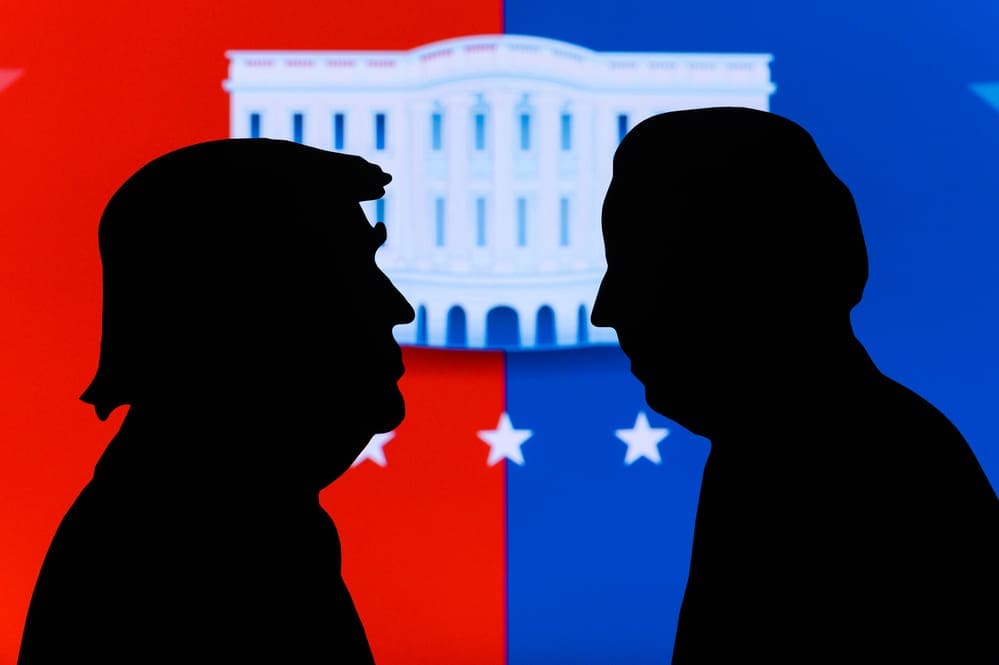
When I was Principal of our local Islamic school, Barack Obama had just become President of the United States. The day after the election, our students arrived with an even greater excitement and cheeriness than usual.
They walked in high-fiving each other and chanting “Obama-USA”. Students were excited that a candidate they wanted had won the national election. However, I knew there were staff members and maybe even students of families that may have voted for the other candidate.
I took this as a teachable moment, an opportunity to have a conversation with students during our morning assembly that as we celebrate the victory of a candidate we wanted, we need to realize that there may be individuals among us who didn’t vote the same way as us. I emphasized that it was now more important than ever to bring everyone together.
Islam teaches us to seek justice and strive for the well being and advancement of everyone around us. This is the way Prophet Muhammad (SAW) lived and practiced. He always took the input from those around him and advice of trusted companions. The Prophet (SAW) brought the community together with the concept of shura, consultation, for the betterment of the entire society. Keeping this in mind, even though we may share different views and perspectives, we all seek freedom, justice, liberty and respect.
This past election and upcoming election however has perpetuated hate, polarized groups and created a tribalistic atmosphere within our own communities. As adults we feel this divisive rhetoric has caused stress and anxiety, and children of all ages have felt that as well. A 2018 study found that 86% of teens and young adults ages 14 to 24 felt emotional stress, anxiety, or fear in the months leading up to the 2016 election. It is more important than ever to provide our children support to steer away from “us versus them” mentality. Here are some tips to help your child deal with the challenges with the upcoming elections:
Elementary age
- There is a great deal of information that comes through the media in short snippets, condensed reads, and sensational headlines. Help your children differentiate what is fact and what might be influenced by other factors. It is vital to help your child understand the driving force behind some of these articles. Have them think about what they are feeling when they read the article, who do they think is the target audience, and also have them think about other views on this specific topic. This way they can connect better with their emotions, learn how to break down the information that comes to them and gives them a better idea about where they stand.
- Find kid-friendly news outlets. There are multiple news outlets that are designed for this age group. Time for Kids, and Scholastic Kids and DOGO News are some sites used in the classroom and can be accessed by parents. These news websites present the events of the day in age-appropriate terms, while steering away from information we don’t want our children to be exposed to.
- As we get closer to election day, campaigns from all sides barrage us with political ads. Have your children decode ads by discussing their purpose, their claims, and how visuals and sound affect the viewer. This is a good time to discuss why campaigns would think negative ads are more effective.
- Read age appropriate books on American politics such as What’s the Big Deal About Elections and We Can Vote. These picture books look at the process of voting. Where Do Presidents Come From gives us fun facts and trivia about the US Presidency and Bad Kitty for President, is a fun story about the U.S. political system.
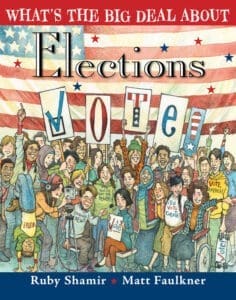 |
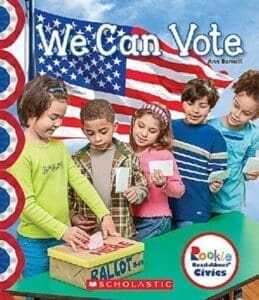 |
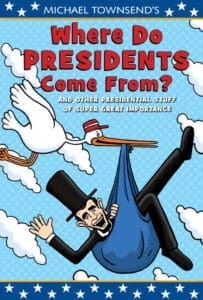 |
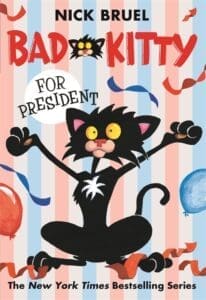 |
- Keep some of the rhetoric at a minimum. It’s important as parents to be mindful of some of these topics and their effect on children. Kids at this age may not fully understand concepts such as racism, guns, and immigration, but they do understand the intense feelings and emotions the adults around them exhibit when these topics come up. If a candidate makes you angry, explain that the candidate made you feel a certain way and why.

Middle School Kids
- At this age, students would be ready to watch and reflect on political debates. Here they can discuss issues presented by the candidates such as who did they think had a stronger presence, who won, and why do they think that. Middle schoolers can think about the role of the moderator and if the candidates stayed on topic and answered questions effectively.
- If your child has access to electronic devices and social media they may have already been exposed to political ads. This is a great time to discuss political advertising, and how they are similar and different to commercials for products and services. Some great discussions can be on asking who is paying for the ad they are watching, and how that affects that content in the ad. Tweens can also elaborate on how these political ads potentially influence the outcome of an election.
- Kids at this age develop a broader understanding of satire and in order to bring light to some of these tense situations, analyzing a political cartoon may bring some much needed light heartedness to some often very tough rhetoric. This way they can understand how challenging claims is a part of the political process and may be interpreted differently by others. Obviously not all political cartoons are appropriate for this age group and parents may need to filter through the ones they deem inappropriate.
- Students will already be exposed through social studies classes to the American election process. A great way to connect with your children and learn or relearn civic engagement is to discuss the election process with them Some great books for this age group include The Election Book, The People Pick a President and Everything You Need To Know About The US Voting System. It may be fun to compare some mock elections at school to local and national elections. You might ask your tween if the election is a popularity contest or if it is based on who has the best ideas.
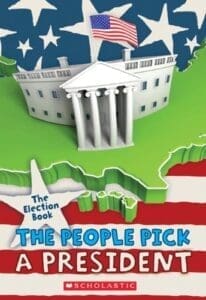 |
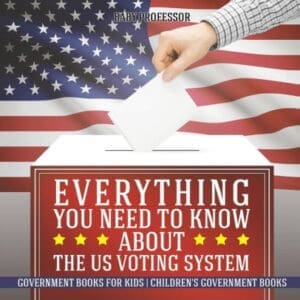 |
- In past presidential elections we learned the impacts of fear mongering and hate speech. Such extreme statements may stir feelings of anxiety, fear and worry. It’s important for us to discuss with our children that these tactics are used to gain votes and some candidates may even resort to insulting and bullying strategies. Talk to your tween when statements are false and discuss which statements are attention-seeking, and which ones are about the policies that the candidate would enact if elected.
High School Kids
- At this age students have had multiple school related experiences in learning American democracy and may have opinions on social issues and views on the election and even certain candidates. They may even be able to vote this coming election. Since this is the initiation into this civic experience, help them understand the election process and encourage them to exercise their right to vote. Remind them it is an honor and privilege to participate in the democratic process. Additionally, this is a great opportunity to connect and especially talk about topics that are important to them, your family, local community and Muslim Americans. Parents and teens can watch news and debates together, compare the news coverage of these debates from different news outlets and media platforms, talk about how these outlets spend time on the issues or use other techniques to incite emotions among their audience.
- Polls are a big part of the election process. At this age they can discuss what are the driving forces behind these polls, do polls influence people, and help them understand the correlation between polls and election results.
- This year social media will play a huge role in the election process. With the presence of the Covid-19 pandemic, face to face interaction is limited and social media has become even more influential Your teenagers may already be exposed to ads, polls and other discussion groups on outlets they watch. Due to the impersonal nature of social media, it’s important to have a conversation with your teens on how to navigate through the process. Additionally, at this age, your teenager may have their own political views and opinions that could be a direct contradiction to their parents political beliefs. Parents may use this as an opportunity to remind them of Islamic perspectives on these topics, but it is important to engage in constructive dialogue with their teens and provide a safe space to share their opinions and viewpoints and nurture independent thinking.
- Continue to talk about fear-mongering and hateful speech that is sometimes used by candidates. At this age teenagers are aware that these messages are intended to elicit an emotional response. These comments may have an impact on voters and the political process. Encourage your teenagers to focus on the policies and not the attention seeking statements on various issues by the candidates.
- Encourage your teens to get involved in local community government, by volunteering with the election at the local state or national levels to show the impact we can have in our communities.
Even though the upcoming election may cause some anxiety, with the right kind of guidance, parents can encourage an excitement around voting as an American right and duty and family orienting experience. Encouraging dialogue and expressing oneself is at the core of the election process at any age. Even though many won’t be able to physically vote, our youth will understand what voting means. Regardless of the outcome of the election, parents will find they have connected with their children, shared with them the value of the process and given them the necessary tools to promote community, enjoin what is good, and ultimately look out for the well being of everyone.

Umama Alam
Umama is an Educator and former Principal of the International Academy of Cincinnati and now serves on their board. She is also an outreach speaker for the Tours and Talks program at the Islamic Center of Greater Cincinnati and is a Board Member of EquaSion, a civic organization founded on interfaith dialogue.


Great article mA. Very relevant and beneficial information.
Very Informational and well written article for all ages. Helpful tips for parents and teachers as well.
So well thought out and written. Love that it is applicable for all ages. Thank you